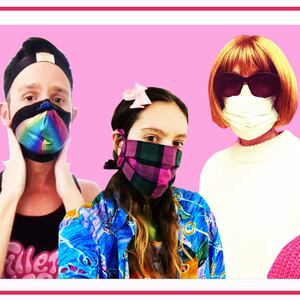In mid-May, as the coronavirus death toll ticked up toward a tragic 100,000 souls, I read a book in my neighborhood park. I wore a mask, kept to myself, and tried to find pleasure in the the warm air I inhaled through a layer of cotton. I did not enjoy having my lips marinate in carbon dioxide and spittle, but hey—at least I was breathing on my own.
A man materialized in front of me, wearing cargo shorts, a Bernie Sanders T-shirt, and no mask. “Take that off,” he motioned to my red covering. “I want to see your face.”
I shrugged off the regrettable new pickup line as a sign of the times and asked where his mask was. “Yeah, I don’t do those,” he said. I took my book and walked away.
This week, as temperatures in my New York neighborhood swelled to oppressive digits, I panted through a different mask as I trudged home from an errand. Rounding the corner, I recognized the Bernie shirt and slow stroll before I saw that man’s face, again uncovered.
“Still no mask?” I asked in passing.
“Nope!” he smiled back, spewing out respiratory droplets that one study found can linger in the air for eight to 14 minutes.
There is no more telling way to wear one’s politics than through opting in—or out of—masking up. (Though the red MAGA hat, visual shorthand for Trump supporters’ perceived exceptionalism, comes close.) The most urgent crisis of our time has born a uniquely stupid culture war, and what should be an easy civility is now a battle ground of asinine takes.
“Reopen” advocates—you know, the protesters who were not subject to police brutality, unlike those protesting against the death of George Floyd—have appropriated the image of Anastácia, a mythical enslaved African woman from 18th century Brazil, for their anti-mask messaging.
A man named Abraham Knofler last week went semi-viral for his “protest” against both a Brooklyn coffee shop’s mask policy and the Black Lives Matter sign hung on its window. (I triple-checked that this was not the same man from my park.) As Gothamist reported, Knofler is a vocal Trump supporter. His seemingly made-for-Twitter tirade had all the pointless pageantry you would expect from a troll who argues for the sake of it.
Far right personalities fake disabilities to get out of covering up in public. And one Palm Beach woman likened her refusal to oblige into the simplest of safety measures to her distaste for underwear: “Things got to breathe.”
The reasons to wear a mask are fairly obvious to anyone who hasn’t, say, hidden in an underground bunker for the past three months. Analysis published in The Lancet this month found that face masks reduce the risk of infection, though this comes after initial mixed messaging from public officials about who should be wearing them. (Remember when we were all urged to donate any stockpiles of N95s we purchased to prepare for the pandemic and go think about all the bad hoarding we had done?)
Anecdotal evidence about the efficacy of masks remains compelling as well. More than a few friends of mine over the past week have cited the case of a Missouri hair salon, where two stylists unknowingly worked while having the coronavirus. There were 185 clients who interacted with both of them, while wearing masks. None of those patrons tested positive and no new cases can be traced to the salon.
Coronavirus numbers did not spike in Minneapolis after protests began in June, a testament to the mobilization of people who took to the streets with protection for themselves and others. (Los Angeles saw a spike, especially among cops, which some say could be due to officers’ spotty record of mask-wearing.)
This may be a small comfort on a blazingly humid day out and about, where mere minutes in a mask leave your face sticky with sweat. Like just about everyone else, whenever I put a mask on, I also begin a mental timer counting down the minutes until I can take the damn thing off.
It’s not unusual to see people walking down the street alone, wearing their masks down, or “chinning it” as my editor calls it. When another person crosses their path, they’ll pull it back on—usually a sign of neighborly love.
Sometimes rounding a corner too quickly can render you nearly bumping into someone sans covering. Pull it back up, give a cordial nod, and move on. No one is perfect.
For the most part, I want to hope there’s not some huge binary between the masked and the unmasked. Sometimes in the evening, I see plenty of good, community-minded people who would probably gladly wear a mask inside a store pop out to walk their dogs without any covering.
Maybe it is their entitlement speaking, to think that they can ditch the mask even for a short time outside. Or maybe, as anyone who has ever accidentally locked themselves out of an apartment knows, they just forgot to grab one before they left the house.
Dr. Ryan Sultan is a psychiatrist in Manhattan and assistant professor of clinical psychiatry at Columbia University. Recently, he has taken an interest in “re-entry anxiety,” or why some feel so stressed about going out after months in quarantine.
“In some ways, people look at masks and it’s a reminder that the world has changed, coronavirus didn’t go away, and is still an issue even though we’ve shifted our focus to different things,” Dr. Sultan said. “That’s uncomfortable for people.”
But for that same reason, masks can be a symbol of resilience. I spent three months in my apartment, staring out of my window and making up soap operas about the people I saw scurrying in the street.
Now, masks allow me to widen my social sphere (a little). I can ride my bike not just to complete an urgent errand, but because I just damn well want to. I can’t fathom why some find coverings an assault on any freedom—I feel more empowered to go about my day knowing any potential germs are somewhat in check.
There can be an overcompensation when half your face is invisible—the desire to send any sliver of humanity to the person who passes you by, even if they can’t see it.
Lauren Moran, a 32-year-old illustrator who lives in Manhattan, recently tweeted, “raise your hand if you still automatically smile at people even while wearing a mask.”
“It’s honestly just a habit for me,” Moran told me. “Most interactions I’ll smile big at someone just because I’m a friendly person, or usually if I like something that the person is wearing I’ll smile at them and give them a compliment to hopefully brighten their day.”
Moran noticed she’s “been more vocal about saying hi or hello” in a mask. “I’ve also been waving and giving a thumbs up a lot too. I’ve even said a few times to my neighbors I’m friendly with, ‘I don’t know if you tell but I’m smiling big at you right now!’”
The pleasantries stop when she passes someone who is not masked. “I do my best to keep as far away from them as possible, but it also lets me know they’re someone who doesn’t care about public health. That’s a person I really wouldn’t want to smile at anyway.”







